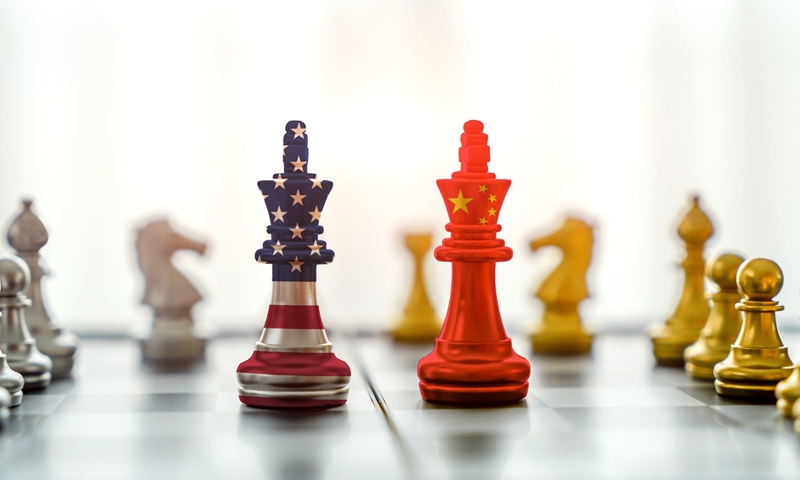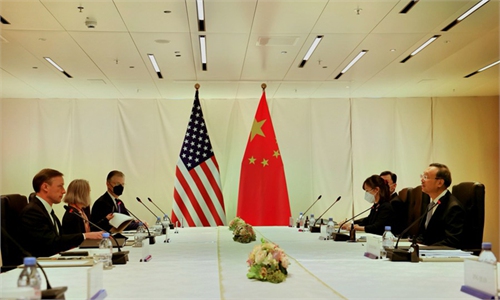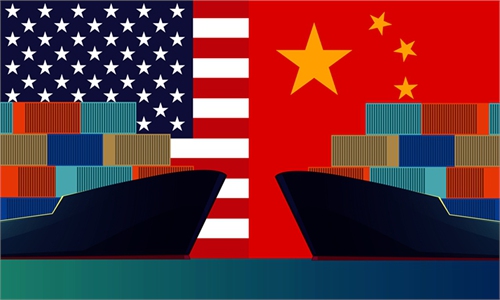
China US Photo:IC
Chinese and US senior officials on Tuesday held trade talks for the second time in October, where they had "pragmatic, candid and constructive" exchanges on the macroeconomic situation, and bilateral and multilateral cooperation, underscoring a rising focus on addressing lingering trade issues even as tensions continue to grow in some other areas.
While details of the discussions were limited, the concise official statement also indicated that the two sides have become more pragmatic in tackling trade disputes, the talks are more constructive in tone, and the content is broader in terms of areas covered, analysts said.
More frequent trade talks are sending positive signals and conducive to easing trade tensions despite a long list of thorny issues, including the US' punitive tariffs on Chinese goods and sanctions against Chinese firms, and bolsters the stabilizing role of economic and trade ties in the bilateral relationship, they noted. Chinese Vice Premier Liu He, who is also chief of the Chinese side of the China-US comprehensive economic dialogue, held a video conversation with US Treasury Secretary Janet Yellen on Tuesday morning, and expressed concern over the US' additional tariffs and sanctions and its unfair treatment of Chinese companies.
They talked at the invitation of the US and the conversation was held at night in the US after working hours, which showed that the US is eager to engage in further communication with China, analysts said.
The resumption of exchanges between the two sides has been promoted to a deeper level and in more specific areas. In a prior discussion between Liu and US Trade Representative (USTR) Katherine Tai on October 9, China urged the lifting of additional tariffs and sanctions.
"Trump's trade policy toward China proved to be against the US interests. The Biden administration needs to adjust its attitude, while the US also needs the support of China on some international issues," Hu Qimu, chief research fellow at the Sinosteel Economic Research Institute, told the Global Times on Tuesday.
It is expected that the USTR and the US Department of Commerce might roll out measures to lift additional tariffs on Chinese goods, at least in an indirect way, Gao Lingyun, an expert at the Chinese Academy of Social Sciences in Beijing who closely follows trade issues, told the Global Times on Tuesday.
"It cannot be ruled out that the tariffs will be cancelled, but the possibility is relatively small. It is more likely to be abolished in an indirect way - for example, in the form of tariff exemptions," Gao said.
Gao also said that removing the tariffs is also in the interests of the US. US companies that trade with China are looking forward to it. It is expected that restrictions on some specific Chinese companies will also gradually be eased.
Liu and Yellen had pragmatic, candid and constructive exchanges on the macroeconomic situation and bilateral and multilateral cooperation, and also agreed to maintain communication, according to a release by the Ministry of Commerce on Tuesday.
China and the US agreed that as world economic recovery is at a critical juncture, it is important for the two countries to strengthen macro policy communication and coordination, the release said.
The last time the two sides mentioned "macro policy" was in their economic and trade exchanges on August 25, 2020, showing that the current world economic recovery is facing an extremely severe situation.
Skyrocketing global commodity prices, tight energy supply and poor international logistics are the challenges facing countries around the world. International coordination is needed to mitigate the negative impact.
"With the marginal weakening of the momentum of global economic recovery, the further recovery of both the Chinese and US economies needs new driving forces. In the medium and long term, the US cannot solve its economic structure problems without the cooperation of the Chinese market and industries, and it also needs China's support on some international issues," Hu said.
Before the Liu-Yellen talks, the Chinese and US heads of state on September 10 talked over the phone, where they agreed to maintain frequent contact and instruct working-level officials to intensify the work, and create conditions for the further development of China-US relations.
On October 6, China's top diplomat Yang Jiechi and US National Security Advisor Jake Sullivan also held talks in Switzerland.
Such frequency has shown some easing in China-US relations, and indicated that the Chinese and US economic and trade teams are implementing the spirit of the September telephone conversation of their top leaders - maintaining steady communication and contact, against the backdrop that some people in the US are still creating conflicts in many areas of China-US relations including Taiwan-related affairs, analysts said.
The US expressed its adherence to the one-China policy in the Yang-Sullivan meeting earlier this month, while China's Foreign Ministry urged the US to stop interactions with the Taiwan Democratic Progressive Party (DPP) authority and stop sending the wrong messages to encourage Taiwan secessionism.
The Taiwan question has always been a chip for the US to contain China. As China has made great progress in the multilateral cooperation mechanism in the Asia-Pacific region, the US' influence has significantly been reduced due to Trump's isolation policy. It cannot be ruled out that the US is using the Taiwan question and South China Sea issues as bargaining chips to gain more say in bilateral and multilateral cooperation in the Asia-Pacific region, Hu said.
Gao also said that some US officials have made tough political statements or crossed China's "red lines," but softened their stance on economic cooperation and made big strides. This is because there are different forces in the US.


